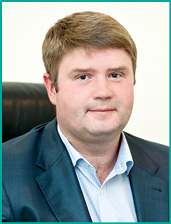Our interview with Elena Alexandrova, HR Director at KRKA Ukraine.
Perhaps no surprise that lack of career prospects is a problem for ambitious highly qualified professionals. The choice in favor of another candidate – no matter be he/she an insider or outsider – can seriously affect the loyalty of even the most committed staff. How to keep staff within a company when there is no opportunity to promote?
Our interview with Elena Alexandrova, HR Director at KRKA Ukraine, was devoted to this and other issues of career development in pharmaceutical business.
Pharm SCHOOL of MANAGERS: Elena, could you please share how to build relationship with future-looking employees focused on career growth prospects when the company cannot promote them at the moment?
Elena Alexandrova: Indeed, a company is able keep the most important corporate assets – its talented and gifted staff – only when such professionals do not feel discomfort due to lack of promotion prospects. So, for example, when a new position is offered to an outsider rather than to a person having worked for the company for a long time, the company should encourage and motivate the employee who was not promoted at the moment. Otherwise such employee may be lost. How to avoid it? I believe that it is employee’s initiative that is a driver to any personal development. Everyone knows the meaning of the words such as “initiative”, “development”, “self-realization”, however fewer than all know what steps should be taken to demonstrate one’s initiative, desire to self-develop and unlock his/her potential at work. It is a corporate mission to help and support its staff, to promote the environment where staff members could achieve their self-development ambitions, and to provide such training that would drive them to their goal.
According to KRKA corporate traditions, we consider our staff members for all new jobs first. So, everybody working for the company has an opportunity to grow and get a new job within the company. However, our corporate tradition of promoting internal candidates does not mean we would reduce the requirements to their knowledge and skills. Everything depends on a staff member: is he/she sincere in his/her desire to get the new job, how great is his/her willingness to learn (training normally requires a staff member to sacrifice his/her nights and weekends), and what have been already done to get such promotion. It is important to know whether the candidate is aware of what would happen when things turned out a couple of months later when he/she gets such job.
Pharm SCHOOL of MANAGERS: However, not everyone can achieve promotion even when such employee is willing to learn and does it best? Is that really self-belief and hard work that could do wonders?
Elena Alexandrova: Let me give you a brilliant example of passion and commitment demonstrated by our employee a few years ago. She wasn’t enough competent to get a product manager’s position and asked: “What should I do to become a product manager?” We smiled in reply.
|
It is a corporate mission to help and support its staff, to promote the environment where staff members could achieve their self-development ambitions, and to provide such training that would drive them to their goal. |
We explained that a product manager played a key role within the company and that a candidate for that position must have had all those qualities and skills she lacked at the moment.
Her self-development took about a year. She actively studied English and marketing and medical literature on her own. Furthermore, she took systematic training with experts in pharmaceutical business and a course in Product Managers’ School. That was an important step on her road to success. As a result, all her efforts were not in vain. You must admit, such dedication and commitment are to be envied. As a rule, candidates stop fighting for a new position when they need to spend a couple of months to get ready for their new job. They shouldn’t have done it: there is no reason to give up when you couldn’t get promotion right now.
Many outstanding business leaders, including those succeeded in the pharmaceutical business, were refused promotion several times before they achieved the pinnacle of their career. However when the company has a highly professional and competent management team, such events are fairly painless for unsuccessful candidates since such situation is normally perceived as an opportunity for further development.
Pharm SCHOOL of MANAGERS: Does further development involve a management role?
Elena Alexandrova: Well, there are many different opportunities for growth within the company. One’s career is not necessarily a move up; there is an alternative way – a horizontal one. I believe employees should be encouraged to acquire new functions and get new skills. With such approach they could enhance their competency and become a more valuable specialist. Those employees able to structure their career goals in a more flexible way appeared to be more open to creative decisions in their career development.
As a rule, candidates stop fighting for a new position when they need to spend a couple of months to get ready for their new job. They shouldn’t have done it: there is no reason to give up when you couldn’t get promotion right now.
In western-style companies, horizontal development is an adequate career promotion. The concept of cross-functional development is applied with increasing frequency. A manager is given a chance to gain experience in an absolutely new role. For example, a manager is switched from Sales to Marketing and gets first-hand knowledge how the company works, how its divisions and departments interact with each other. Such approach to career development helps learning not only the principles of corporate organization, but also enables the employee to acquire new professional experience for his/her further development and career growth.
Some employees believe they reached the final point of their development within the company when they aren’t promoted for some reasons, that’s especially true when they feel they deserve such promotion. Many companies use promotion as a reward, so there is a kind of competition where the winner takes it all. So, when a highly skilled specialist is not promoted he/she perceives such situation as a false signal his/her merits are undervalued and his/her current position is the best one within the company.
At the same time, promotion may become a huge mistake in some cases both for the company and for the employee. For example, a company hires a manager who is not competent enough rather than to hire a very good medical representative. At his previous position, such employee coped with his/her functions brilliantly and does his/her best in his/her new role but lacks necessary knowledge and competences.
Pharm SCHOOL of MANAGERS: What can be done to avoid such situations? Could we identify whether an employee would be effective in his/her new role, how to identify promising candidates? Does everyone seek promotion?
Elena Alexandrova: If an employee does need further development, higher level of decision-making, expansion of his/her power and authority, the company can offer a project where he/she could demonstrate himself/herself.
For example, KRKA hold its annual competition ‘You Can Do More’. It is a set of theoretical and practical tasks in different areas of corporate operations. This project provides an excellent opportunity for our leaders to find and reward medical representatives willing to take every effort to reach new heights.
Such tasks require a lot of time and effort. Medical representatives are invited to do what they haven’t done before and present their projects. As a rule, such presentation allows us to evaluate the quality of the preparatory work: what materials have been used, what he/she has considered to be important, what mistakes have been made, what approach he/she pursued to resolve the problems and how many personal ideas and proposals he/she has presented, whether his/her manner of presentation was convincing etc.
Moreover, to be successful, one should clearly understand its career goals and discuss them with his/her line manager. Whenever a staff member has concerns, his/her line manager should know them. For example, face-to-face communication may help to find out that career development is not a driver for the employee at the moment. Sometimes the decision to change the roles or even leaving the company is affected by emotions or circumstances. This may include lack of interesting projects, difficult relationship with colleagues, busy schedule that does not meet the expected level of reward, family situation etc. Having identified the true cause of employee’s desire to change the job, the company can offer what he/she needs at the moment. Being attentive to an employee can solve many issues. The company may sometimes offer an employee to act as a mentor for newcomers, to join a new project or other challenges. A line manager or HR team member are always ready to meet and find the best solution for any specific situation.
Pharm SCHOOL of MANAGERS: Should an employee be proactive and be willing to join a new projects to achieve promotion? Is that a key to a successful career?
Elena Alexandrova: Talking about career advancement, no one can give you a one-for-all tip or advice. Every company has its corporate traditions and rules. Nevertheless, I am sure no change would be brought about unless it is driven by employee’s initiative. Participation in corporate competitions and projects, expansion of one’s role on one’s own, making suggestions how to
improve the qualitative and quantitative measures of work, achieving accomplishments, adherence to corporate rules – all these efforts will certainly demonstrate one’s commitment to success.
Whatever the business might be, one needs to do something to bring changes.
As a rule, you have to do what you have never used to do, have to make an extra effort. You need to get out of your comfort zone – that would never be an easy way. So, before taking a step to changes, think over and weigh. Ask yourself, do you really want it? If the answer is “yes”, release yourself and move forward!
“That’s impossible!” said Reason.
“That’s madness!” noted Experience.
“Useless!” snapped Pride.
“Try it …” whispered Dream.








